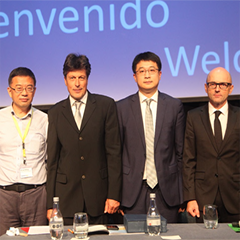Munich, December 14, 2017 – The Munich based chemical company WACKER and Royal Tech CSP Limited, a Chinese specialist for the development and promotion of highly efficient solar thermal systems based on concentrated solar power technologies, have received the Technology Innovation Award from the SolarPACES technology network. The award was presented for a joint development project in the field of solar thermal energy. Since 2016, the two companies have been testing a new heat-transfer medium for parabolic trough collectors in a solar thermal power plant in Inner Mongolia (China). The silicone fluid that WACKER developed for this technology is extremely resistant to high and low temperatures. With the project, the two companies were able to demonstrate that the new heat-transfer medium significantly improves the cost/benefit ratio of such plants.
Professor Zhifeng Wang, Vice Chair of the Executive Committee and Head of Solar Thermal Energy and Photovoltaics at the Chinese Academy of Sciences in Beijing, presented the technology award at the 23rd SolarPACES Conference in Santiago, Chile. The distinction was awarded for the efficient cost-benefit ratio provided by the silicone fluid thanks to its heat resistance and longer service life, said Wang.
Most of the heat-transfer media currently used consist of aromatic hydrocarbon compounds. Because of their limited thermal load capacity, they can only be used up to about 400 °C. Higher temperatures result in a significantly shorter lifetime of the medium. Low temperatures, too, are a problem. At exterior temperatures below 12°C, such media solidify, and therefore solar power stations often have to be equipped with trace heating. “The medium’s heat and frost resistance have a significant effect on the cost efficiency of industrial solar thermal power plants”, Wang emphasized in his speech.
The new WACKER silicone fluid, marketed under the name HELISOL®, on the other hand, is suitable for operating temperatures up to 425°C, and is still liquid at -40 °C. That allows significantly higher efficiencies and energy yields to be obtained. Silicones also release less hydrogen than conventional media. Experts therefore assume that the receiver in which the oil circulates will have a significantly longer lifetime. „WACKER and Royal Tech succeeded in extending the physical limits for the high- and low-temperature resistance of heat-transfer media in solar power plants. Operators of large-scale systems can now use them to significantly improve the cost/benefit ratio and reliability of their systems,” said Professor Wang.















